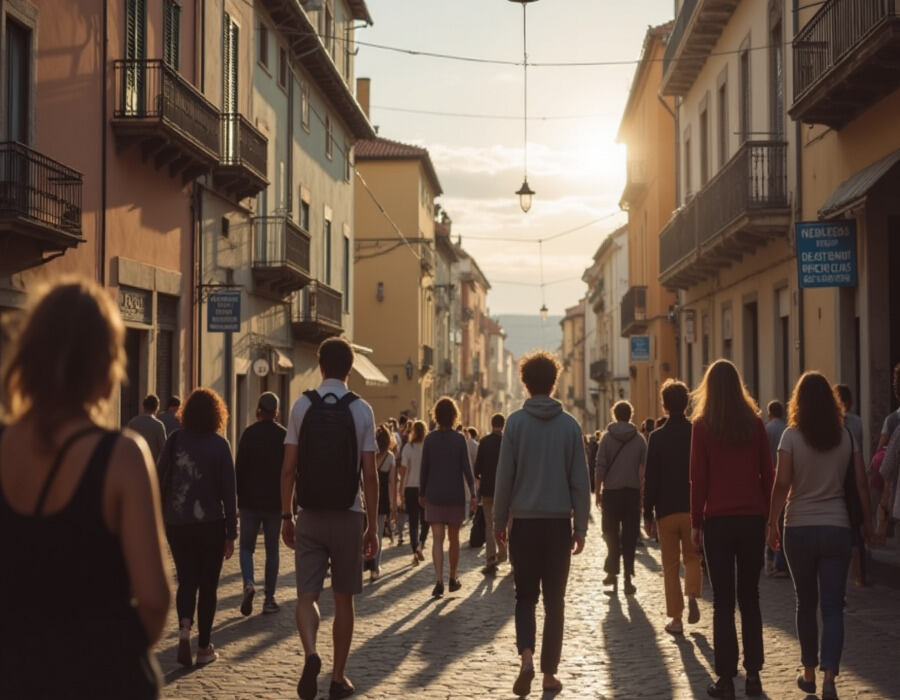Friday, July 18, 2025
As overtourism continues to surge across Europe, cities in Spain, Italy, Portugal, France, Belgium, and Italy are facing mounting protests from local residents. These communities are increasingly demanding urgent action to curb the impact of rising tourist numbers, which have driven up housing costs and strained local economies. The overwhelming influx of visitors has resulted in skyrocketing property prices, displacement of residents, and higher living expenses, prompting a call for stronger regulations to protect local populations from the adverse effects of unchecked tourism.
Rising Protests Against Overtourism Across Europe as Locals Demand Action
European cities are grappling with increasing protests as locals in Spain, Italy, and Portugal voice their discontent over the effects of overtourism. With banners reading “Tourists Go Home” and “Your Holidays, My Misery,” these demonstrations highlight the growing concerns of residents who are being pushed out of their neighborhoods due to skyrocketing housing costs and rising living expenses. The surge in tourism is seen as a driving factor behind the displacement of local communities, triggering calls for greater control and regulation in the tourism sector.
Over the past decade, there has been a notable rise in the number of international tourists flocking to Europe, especially from India. According to the latest data, an impressive 8.5 lakh Indian tourists visit Europe each year, and of this number, nearly 3.4 lakh are from Gujarat. The availability of affordable travel packages, promotions, and the presence of Gujarati cuisine has made European countries particularly attractive to tourists from this region. This increase in visitors has undoubtedly contributed to the growing popularity of Europe as a travel destination, with approximately 3.5 lakh Gujaratis traveling to Europe annually.
Tourism has become a vital economic driver for several European nations, particularly for countries like Italy, Spain, and Portugal. The tourism sector now contributes approximately 6% to their GDP, with Indian tourists representing a significant portion of this share. It is estimated that 40% of this 2% contribution from Indian tourists comes from Gujaratis. While this influx has positively impacted the economy, it has also come with unintended consequences that are beginning to raise alarm among local populations.
One of the most significant side effects of this surge in tourism is the impact on the housing market. According to Eurostat, Italy experiences approximately 450 million tourist stays annually, while Portugal records around 480 million. This influx has created an intense demand for short-term accommodations, leading to the conversion of more than 8,000 local homes into homestays and vacation rentals. As a result, local residents are facing higher property prices, and in many cases, they are being priced out of their own neighborhoods. The situation is exacerbated by the fact that many of these short-term rentals are not subject to the same regulations as traditional housing, further driving up costs for locals.
The housing crisis is not the only challenge brought about by overtourism. Locals are also grappling with higher daily living expenses, as the influx of tourists drives up the cost of goods and services in popular destinations. According to reports, a staggering 93% of tourists visiting Europe choose to go to Italy, 97% opt for France, and 89% head to Belgium. Of these tourists, around 33% stay in hotels, while 49% opt for homestays, further adding pressure to local resources and infrastructure. With such high numbers of visitors, residents are finding it increasingly difficult to make ends meet as the cost of living continues to rise.
Protests have become more frequent in these cities, as local residents demand stronger regulations to control the number of tourists and mitigate the negative effects on their communities. Many locals are calling for stricter limits on short-term rentals, better enforcement of existing laws, and measures to protect local housing from being turned into tourist accommodations. The protests are a direct response to the growing concern that tourism is no longer benefiting the local population but rather exploiting it for economic gain.
In Spain, the situation is particularly dire, with Barcelona being one of the most heavily affected cities. In recent years, Barcelona has seen a sharp rise in the number of tourists, which has led to the displacement of local residents and the deterioration of neighborhoods that were once affordable and thriving. Similarly, in Lisbon, the rapid rise in property prices has made it increasingly difficult for locals to secure affordable housing, leading to heightened tensions between residents and tourists. The issue is not limited to these cities alone; other popular European destinations such as Venice, Rome, and Paris are also feeling the pressure as tourism continues to rise unchecked.
In light of these mounting concerns, governments and local authorities are under increasing pressure to find a balance between promoting tourism and safeguarding the interests of local residents. While tourism is undoubtedly an important part of the economy, there is a growing recognition that it must be managed in a way that does not come at the expense of local communities. Cities across Europe are exploring ways to implement more sustainable tourism practices, such as limiting the number of tourists allowed to visit certain areas, introducing higher taxes on short-term rentals, and encouraging visitors to explore less popular destinations to spread the impact of tourism more evenly.
Protests are escalating across Spain, Italy, Portugal, France, Belgium, and Italy, as locals demand action against overtourism, skyrocketing housing costs, and economic strain caused by the overwhelming influx of tourists.
As protests continue to grow, it is clear that a new conversation is unfolding across Europe about the future of tourism and the need for greater regulation to protect local communities. The challenges of overtourism are complex and multifaceted, but with increased awareness and concerted efforts from both residents and authorities, it is possible to create a more sustainable and balanced tourism model that benefits everyone involved. In the meantime, the message from protesting locals remains loud and clear: the time has come for change.
